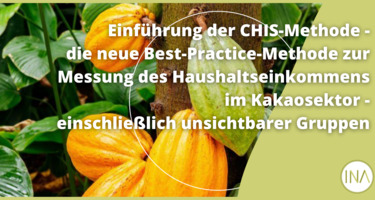Cocoa Household Income Study - Launch
To answer these questions, the Alliance on Living Income in Cocoa (#ALICO) has developed a Cocoa Household Income Study approach (CHIS), an open-source methodology for reliable and scalable income measurements in the cocoa sector.
This methodology is important as it enables evidence-based policy and intervention design based on the analysis of good quality data for different household groups. We hope that it contributes to greatly reducing or closing the living income gaps of farming households.
Under the roof of ALICO this methodology was led and funded by the World Cocoa Foundation (WCF) and the German Federal Ministry for Economic Cooperation and Development (BMZ), in collaboration with the German Development Cooperation (GIZ) and the Swiss Platform for Sustainable Cocoa (SWISSCO). This joint effort has been delivered by Wageningen University Research (WUR) and the Royal Tropical Institute (KIT) who partnered with CIRES and EMC from Côte d’Ivoire. Partners of ALICO, like WCF, GIZ, the Initiatives on Sustainable Cocoa (ISCOs), the Sustainable Trade Initiative (IDH), the Living Income Community of Practice (LICoP) and the Voice Network, alongside representatives from cocoa-producing country governments jointly supported the development of this new best-practice standard methodology. CHIS provides harmonized and reliable data, that particularly also sheds a light on the often-overlooked "invisible groups" in cocoa supply chains, like women, youth, sharecroppers, caretakers and farmers of the indirect supply chain, that previously have not been included in data surveys. Accurately measuring cocoa farmer household income, living income gaps and their production costs will be key to understanding the impact of sustainability interventions on cocoa farmer households and the environment. The Cocoa Household Income Study (CHIS) methodology, validated with local and international stakeholders during a hybrid workshop in Abidjan,Côte d'Ivoire, has been officially launched at the #Amsterdam Cocoa Week. The CHIS methodology optimizes investments and robustness and includes minimally required data to be collected while providing recommended approaches for those seeking deeper insights.
Helping cocoa farmers succeed requires everyone in the cocoa sector to work together. Therefore, having one common methodology to measure and compare how much income cocoa farmer families get is important to help us understand their economic situation accurately.
A large proportion of the cocoa farming households cannot meet fundamental needs such as access to sufficient quantities of nutritious food, education for their children, or essential healthcare services. Moreover, the majority find themselves unable to afford decent housing, cover transportation costs, or establish financial buffer for unexpected events, e.g. in case of family illnesses or lower yields because of climate change. They also cannot invest much money in growing their income in an entrepreneurial way because of their financial situation. This methodology is to ensure that better data and insights become available to design effective interventions for different types of households, that substantially reduce and close living income gaps, without leading to the exclusion of the poorest from interventions and markets they supply to.
To understand what works in helping raise cocoa farmers’ incomes, we first need to be able to consistently measure how activities affect those incomes. This methodology gives everyone in the sector a firm foundation to stand on and ultimately helps us drive collective progress to improve cocoa farmers’ incomes.
With this methodology in hand, WCF, GIZ and SWISSCO are resourced to conduct baseline studies on cocoa farmer household income in three landscapes in Côte d’Ivoire as a second phase of the ALICO collaboration. WCF will implement an income study later in 2024 in the Yapo Abbé and GIZ around Bossématié. For the implementation of the baseline study around Bossematié, GIZ will closely collaborate with the German Initiative on Sustainable Cocoa (GISCO) and the initiative’s project PRO-PLANTEURS, co-financed by the Ivorian Coffee-Cocoa Council. Similarly, other academic institutions, companies and government agencies can use the methodology in their own research and data collection, reinforcing a common standard for the entire industry.
Through CHIS, we and our partners advocate for standardized, high-quality income data of cocoa farmers to strengthen political discourse, whether past interventions have been sufficient to ensure decent incomes for cocoa farmers in Côte d'Ivoire or whether we still have to address imbalances in value chain distributions.
Alliance on Living Income in Cocoa (ALICO):
Under the roof of the multi-stakeholder platform ALICO, its partners of the private sector, the civil society, the ISCOs, GIZ and other partners jointly contribute to a systemic change in the cocoa sector to ensure that farmers receive a living income, with an initial focus on West Africa (Côte d‘Ivoire, Ghana).
